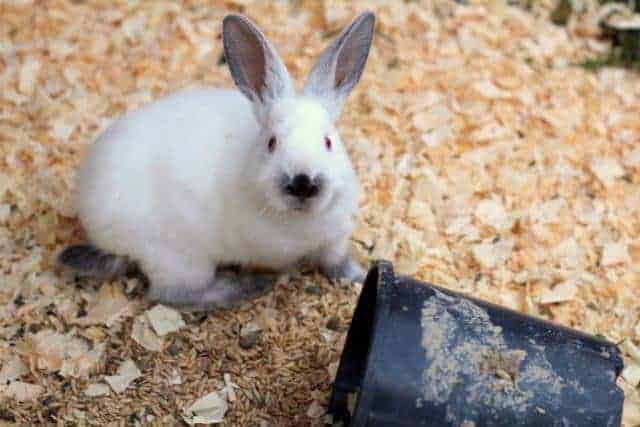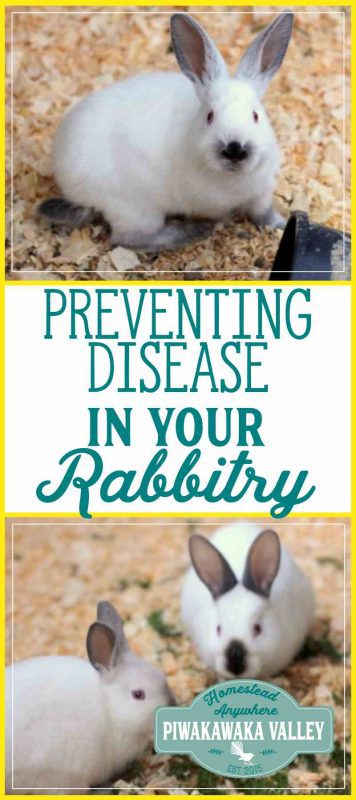This post was most recently updated on July 27th, 2021
Healthy strong stock will avoid most rabbit diseases. You can breed your rabbits to be resistant to most illnesses, and to be resilient and strong. However, there are always times where animals will get sick. If you are wondering how to treat a sick rabbit, read on!
Please read: This information is provided for educational purposes only and is not intended to treat, diagnose or prevent any disease. We encourage you to make your own health care decisions in partnership with a qualified health care professional.
This post contains affiliate links, this means at no extra cost to you, we make a commission from sales. Please read our Disclosure Statement
Below is also what to do for a sick rabbit in case your wonderful preventative methods are foiled by a disease.
How to Grow Resilient Rabbits
Choose your breeding stock from the best of the best that you have access to, and cull any stock that show illness/weakness. This will result in you having very little trouble with rabbit diseases in your rabbits.
Culling rabbits does not mean to kill them. It simply means to remove them from your breeding stock. In our house, that means to add them to the dinner table, but that does not have to be the case. You can remove them to their own area, or simply not let them visit the buck, or you can sell them on as pets.
Good nutrition is the next most important pillar to preventing rabbit diseases in your rabbitry. Ensure your rabbits get plenty of whole grains, fresh vegetables, unlimited hay, fresh water and a mineral supplement. If you prefer pellets ensure that they are a complete meal option for them.
RELATED: How to get optimal growth in your rabbits
Provide Suitable Healthy Housing
Keep the rabbitry clean and dry. This will go a long way toward preventing many rabbit diseases. Avoid moldy bedding, and keep the floors clean.
If you are using a deep litter system, add fresh bedding regularly, especially where they toilet. If your floor is a soil/dirt floor you can seed it with grass/grains and water it to reduce/remove the urine on the surface.
Barn lime can be sprinkled over the floor, and in very wet urine areas to reduce the ammonia in the air. There is a direct correlation between the level of ammonia in a rabbitry and the amount of respiratory disease in rabbits.
An effective manure removal system and 10–20 air changes per hour are necessary to reduce the ammonia to an acceptable level. To do this, we simply have the side of our shed open, enclosed in wire.
Want to know all about raising rabbits in a colony?
Check out our very own book here:
Available on Kindle and in paperback or from our store
Managing New Stock
All new stock should be quarantined for 4 weeks away from the main rabbitry. Feed/tend to them last on your rotations and wash your hand/clothes/equipment extremely well after contact.
If all this prevention doesn’t work and you still end up will illness in your rabbitry, you are not alone! Usually these illnesses have come from contact with an infected animal/person/food.
RELATED: 10 best meat rabbit breeds
What to do if a Rabbit is Sick
1. Mark or note pens that contain sick animals.
2. Isolate sick animals. If possible, keep them in rooms or buildings separate from healthy rabbits.
3. Care for the sick animal last. Only after all other rabbits in the herd have been cared for to prevent carrying infection from sick to healthy rabbits. Be sure to wash hands and disinfect boots after caring for sick animals. Clean and disinfect any equipment moved from an area where there are sick animals to the pens containing healthy animals.
4. Get help. If you cannot determine the cause of the trouble quickly, send a few typically sick rabbits to a diagnostic laboratory or your local veterinarian.
5. Keep your place clean. Destroy all hopelessly sick animals and bury or burn all dead animals. Open disposal pits are not recommended.
6. Clean and disinfect all pens before placing new rabbits in them.
To find out what illness it might be, and how to treat it, have a read of our Rabbit Diseases Guide
Related: The Ultimate Guide to Raising Colony Rabbits
Please Pin and Share!











